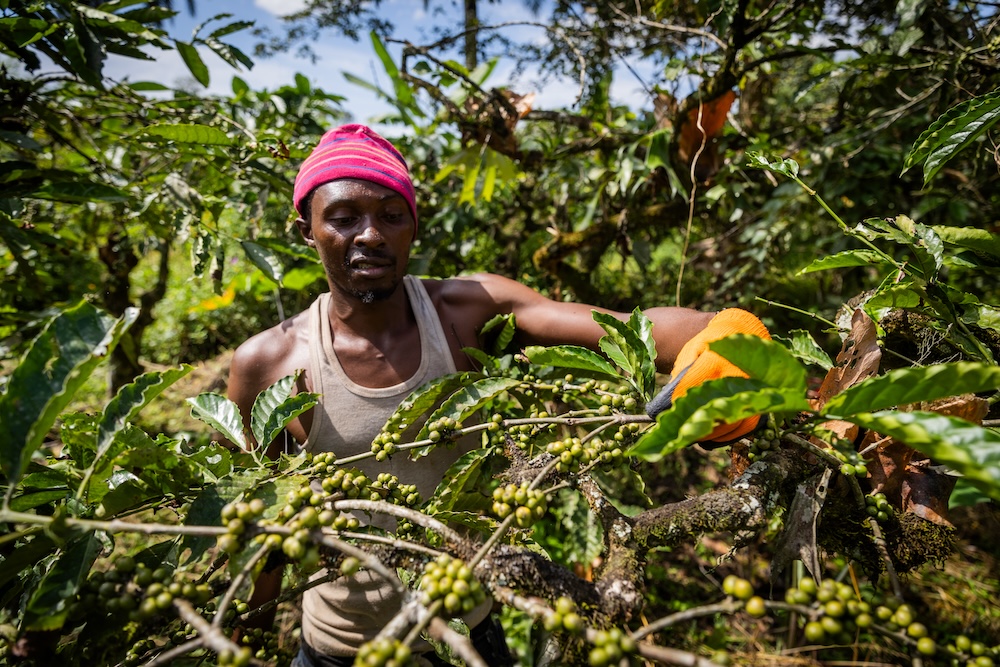Tanzania, a country known for its stunning landscapes, is also home to a hidden gem. This gem is none other than its coffee beans.
Tanzania coffee beans are a delight for coffee connoisseurs worldwide. They offer a unique blend of bright and vibrant flavors.
These flavors are a result of the country’s unique geography and soil. The presence of Mount Kilimanjaro and other volcanic soils enrich the taste of these beans.
In this article, we delve into the world of Tanzania coffee beans. We explore their distinctive flavor profile, cultivation practices, and comparison to other African coffee varieties.
Whether you’re a coffee shop owner, a barista, or a coffee enthusiast, this guide will enlighten you. It will encourage you to experience the vibrant flavors of Tanzania coffee beans yourself.
The Unique Geography and Soil of Tanzanian Coffee Regions
Tanzania’s geographical location plays a significant role in the quality of its coffee beans. The country is located near the equator, providing an ideal climate for coffee cultivation.
Moreover, the presence of Mount Kilimanjaro and other volcanic soils enriches the ground. This volcanic soil is rich in minerals, which contributes to the unique flavor profile of Tanzania coffee beans. The combination of these geographical factors makes Tanzania a prime location for producing high-quality coffee beans.
The Distinctive Flavor Profile of Tanzania Coffee Beans
Tanzania coffee beans are renowned for their bright acidity and a range of flavors. These flavors can vary greatly depending on the region, but they often include fruity and floral notes.
The beans also have a medium to full body, providing a satisfying mouthfeel. The aftertaste is typically sweet, often described as sugary or honey-like.
Here are some common flavor notes found in Tanzania coffee beans:
- Fruity: Berries, citrus, and tropical fruit
- Floral: Jasmine, rose, and hibiscus
- Sweet: Honey, brown sugar, and molasses
- Spicy: Clove, cinnamon, and black pepper
These complex flavors make Tanzania coffee beans a favorite among coffee connoisseurs. Whether you’re a seasoned coffee drinker or a novice, the vibrant flavors of Tanzania coffee beans are sure to delight your palate.
Arabica vs. Robusta: Tanzania’s Coffee Varieties
Tanzania produces both Arabica and Robusta coffee beans, with Arabica being the predominant variety. Arabica beans are known for their delicate, nuanced flavors and lower caffeine content. They thrive in the high-altitude regions of Tanzania, particularly on the slopes of Mount Kilimanjaro.
Robusta beans, on the other hand, are more robust and hardy, as their name suggests. They have a higher caffeine content and a stronger, more bitter flavor. While less common than Arabica, Tanzanian Robusta beans are still highly valued, especially for their use in espresso blends.
Small-Scale Farming and Its Impact on Quality
In Tanzania, coffee farming is primarily done on small-scale farms. These farms, often family-owned, cover just a few acres of land. The small scale allows for meticulous care of the coffee plants, leading to high-quality beans.
However, the small size of these farms can also lead to inconsistencies in the beans. Without the resources for advanced farming techniques, the quality of the beans can vary from harvest to harvest. Despite these challenges, the dedication of Tanzanian farmers often shines through in the vibrant flavors of their coffee beans.
Sustainable Practices and Organic Beans in Tanzania
Tanzania is adapting to the growing demand for organic beans. Many Tanzanian farmers are adopting sustainable farming practices, focusing on maintaining soil health and biodiversity. This not only benefits the environment but also contributes to the unique flavor profile of Tanzania coffee beans.
However, transitioning to organic farming is not without challenges. It requires significant investment and education. Despite these hurdles, the potential benefits – both for the environment and for the quality of the coffee – make it a worthwhile endeavor for many Tanzanian coffee farmers.
The Harvesting and Processing Techniques in Tanzania
The harvesting and processing techniques used in Tanzania play a crucial role in the final taste of the coffee. Coffee cherries are typically hand-picked at the peak of ripeness, ensuring the highest quality beans. This meticulous process contributes to the vibrant flavors and bright acidity characteristic of Tanzania coffee beans.
The wet-processing method is commonly used in Tanzania. This involves removing the pulp from the coffee cherries before they are dried. This method enhances the clarity and flavor of the beans, further distinguishing Tanzania coffee beans in the global coffee scene.
The Cultural Significance of Coffee in Tanzania
Coffee holds a significant place in Tanzanian culture. It’s not just a commodity, but a symbol of community and hospitality. Traditional brewing methods are still practiced in many parts of the country, adding a cultural richness to the coffee experience.
Moreover, coffee farming is a vital part of the Tanzanian economy. It provides livelihoods for many small-scale farmers and contributes significantly to the country’s exports. The importance of coffee in Tanzania extends beyond its taste, reflecting the country’s history, culture, and economic resilience.
Brewing the Perfect Cup: Tips for Tanzania Coffee Beans
Brewing Tanzania coffee beans to perfection requires attention to detail. The water quality, grind size, and brewing method all play a role in extracting the vibrant flavors of these beans. Using filtered water and a burr grinder for a consistent grind can enhance the taste.
The brewing method can also influence the flavor profile. Pour-over methods, like the Chemex or V60, can highlight the bright acidity and complex flavors of Tanzania coffee beans. Experimenting with different brewing techniques can help you discover the unique characteristics of these African coffee beans.
Comparing Tanzania Coffee Beans to Other African Coffees
Tanzania coffee beans hold their own when compared to other African coffees. While Ethiopian beans are known for their wine-like acidity and fruity flavors, Tanzanian beans often exhibit a brighter acidity with a wider range of flavors. These can include notes of black currant, grapefruit, and even savory tomato.
Kenyan beans, on the other hand, are renowned for their intense, wine-like acidity and strong berry flavors. Tanzanian beans, particularly the peaberry variety, can offer a similar intensity of flavor but with a broader spectrum of taste notes. This makes Tanzania coffee beans a versatile choice for coffee enthusiasts.
Supporting Tanzania’s Coffee Economy: Ethical Sourcing and Direct Trade
Ethical sourcing and direct trade play a crucial role in supporting Tanzania’s coffee economy. By choosing Tanzania coffee beans, consumers can contribute to the livelihood of local farmers and the overall economy of the country. Direct trade relationships between farmers and buyers ensure fair prices and can lead to improved quality of the beans.
Moreover, ethical sourcing promotes sustainable farming practices. This not only benefits the environment but also enhances the flavor profile of the beans. Therefore, when you buy Tanzania coffee beans, you’re not just purchasing a product, but also supporting a community and a sustainable future.
Experience the Taste at Daily Grind Coffee
Ready to experience these unique flavors for yourself? Visit Daily Grind Coffee and savor a cup of freshly brewed coffee from our carefully selected origins. Can’t make it to the shop? No problem! You can also order freshly roasted beans directly from Daily Grind Coffee Roastery. Enjoy the rich, complex taste right in the comfort of your home. Order now and discover why our coffee is a favorite among enthusiasts worldwide.





















